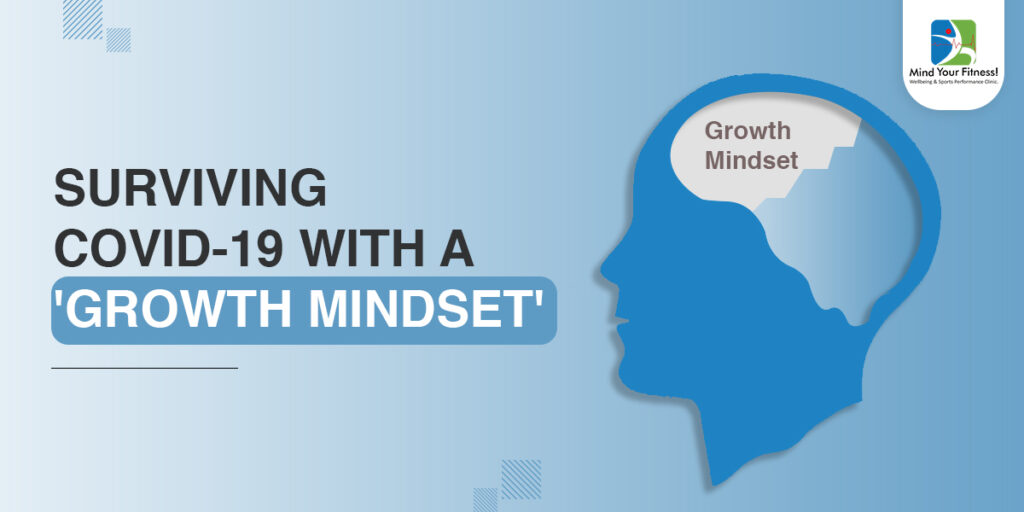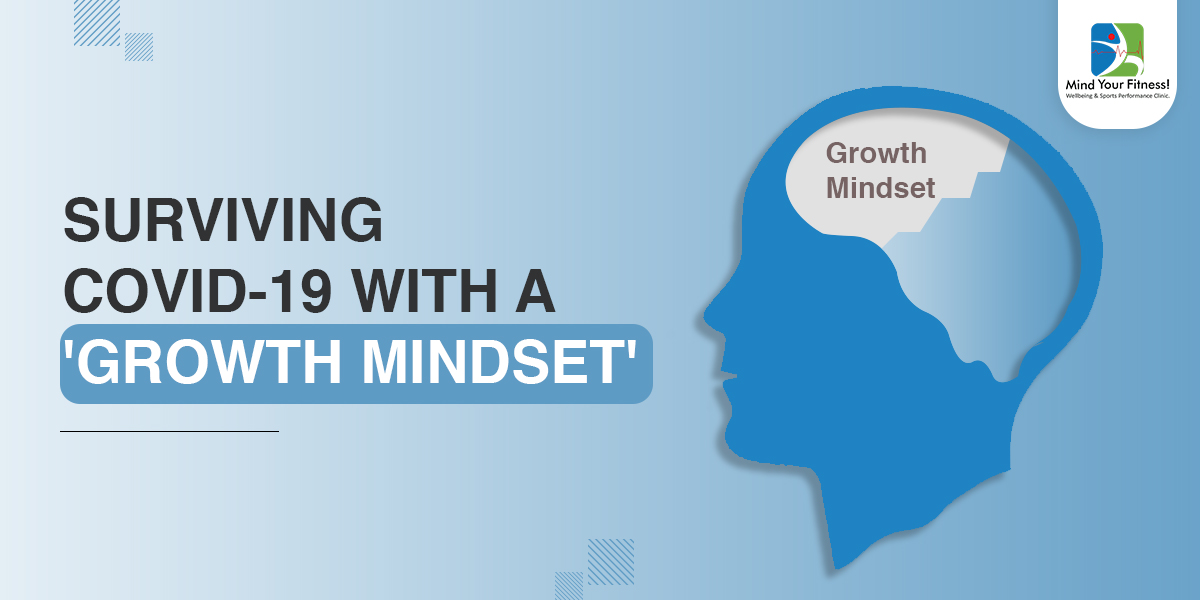
As we continue to live under a shadow of uncertainty, many are experiencing what experts are calling “ COVID- 19 SHOCK”. It’s no surprise that if we want to survive through these unprecedented times, there has to be a critical change in our lifestyle and a re-examination on our part on how we approach a crisis. There are several soft skills you can cultivate, in order to deal with such an ‘uncharted terrain’, but the biggest impact in the end will come from the way you have learned to see things; your mindset.
To paint the picture, let’s go back to 24th August 2004, Athens Olympics, 200mts heats. Usain Bolt, then 17 years old, made the Jamaican Olympic team for one race in the Greek capital — the 200m. He came to the Games with the second fastest time in the world in the event in 2004. As the gun goes, he takes off, exhibiting the athletic dexterity he is so distinguished for. In the home straight however, his speed tails off and he crosses the line 5th, his Olympic experience was concluded before it even really commenced.
Now this is where the tale unfolds and gives a path to two story lines, each as true-to-life as the other.
In the first, Bolt concludes that his failure to go further in Athens is suggestive of his privation of talent. The hurdles in his road to success seems too big, and the enormity of the labor needed to pursue his dreams must mean he doesn’t have what it takes to be the elite athlete he had dreamed of. Later in the games he watches Shawn Crawford sprint to victory, and walks away from the sport for good, accepting he simply wasn’t up to the task.
Now the second plot may sound more familiar to you. Usain Bolt and his coach sit and scrutinize the errors made as a sign of the capacity Bolt demonstrates in reality. They work vigorously for four years, discovering what best training suits Bolt, capitalizing on his strengths and building up his weaknesses. He takes all the challenges as learning opportunities, feedback as fuel and obstacles as tests of his own labor. By the time the 2008 Olympics came around, he secured victory in the 100m, 200m and 4x100m relay. And to this day, his legacy is that of the fastest man in the world.
Now this particular two-story line exemplifies two opposing mindsets, as outlined by Carol Dweck in her groundbreaking psychological research.
A mindset can be defined as a person’s way of thinking and their opinions.
The first is a fixed mindset, in which individuals believe that their talent, intelligence and capabilities are determined and unalterable. And if they fail at something, they take it as a sign of their lack of talent and avoid the task at all costs to protect their self-esteem.
The second is the growth mindset, on which most high performers thrive on. Those with a growth mindset are open to challenges and use failures as lessons, something they can learn from. A growth mindset, as argued by Dweck, leads to people trying to be the best version of themselves, and therefore being more likely to fulfil their potential.
Why is growth mindset more important than ever?
With the COVID-19 shock possessing a “growth mindset” has never been more important than now. The world is changing at an incredibly fast pace, and there are new challenges we must face every day. Our way of life is changing, norms are changing, and we must keep up and adjust to all of these changes. This is why having a growth mindset is so necessary. The underlying and constant feeling of uncertainty during these times may trigger periods of low productivity at the workplace. Either in times of crisis or not, either in personal or in career life, those with a growth mindset will find it easier to reach positive outcomes through innovation and resilience
How to develop a growth mindset?
As we are forced to take on new challenges, face new uncertainties, and recover from mistakes in the Covid-19 era, it’s important to begin to internalize that your own abilities are not fixed, but rather can be developed.
While it’s nice to talk about the benefits of a growth mindset, learning a new practice is challenging and the lack of immediate, measurable progress can be discouraging. Forgive yourself, and be generous with others — try to focus on the effort being put in and the valuable insights you’re learning from that effort, rather than the lack of immediate results.
When it comes to developing a growth mindset, the very word ‘growth’ can help you cultivate a growth mindset.
G: Goals
R: Reflection
O: Opportunity
W: Working the Controllable
T: Thrive
H: Hardiness
- Develop goals even in the dark times: Firstly, Is your goal to survive this pandemic or is your goal to thrive during this period of immense change? The answer to that question is heavily dependent on your mindset. Are you solely thinking about getting back to ‘normal’? That means hunkering down and waiting out this period of isolation. This is the ‘survive mentality’ and through it we fail to see the opportunity to emerge better and more capable than before. Our mindset is seeing this time as a threat to our way of life and our future selves. Take this time to create clear, realistic goals based on your passion and purpose. And be sure to give yourself enough time to conquer them thoroughly.
- Guided self-reflection: Self-reflection allows you to take a step back and gain perspective on your own journey, what is that you can still improve. It allows you to process and achieve clarity on things. Cultivate self-acceptance and self-approval. Learn to trust yourself.
Amidst self reflection it’s also important to become self aware. Start to pay attention to the words you speak , even the words in your mind. If your words are self-downing or self-defeating, the results may be also . So watch yourself. Listen to what you are saying and thinking. Censor yourself and become your own guide. Replace negative thoughts with more positive ones to build a growth mindset.
- Opportunities not threats: If you find yourself terrified in the face of a serious challenge, stop and reframe the situation in your mind. Consider your challenge as an “opportunity” thus slightly shifting your perspective to make it easier for you to engage. Each challenge or opportunity invites us into a new experience that is a sort of adventure. Remember, you are building an approach goal and not an avoidance goal while developing a growth mindset
- Working the controllable: At the moment we live in a world where there is abundance of uncertainty. At this point it becomes far more important to focus on elements we can control. By focusing on the things you can control, you keep your head in the game whilst ignoring the voice that says something can’t be done and find a positive solution.
- Thrive Mindset: As humans, we’re often inclined to feel threatened when we are surrounded by uncertainty and have no way of predicting what lies ahead. If you get stuck in a threat mindset, there’s no way for you – or your brain – to see the opportunity that can arise. You will get trapped in a narrow survival mentality. You need to train your mind to reframe threats as possibilities, and to use your current circumstances as a chance to thrive and grow.
- Cultivate Hardiness: Hardiness or grit is about sustained, consistent effort toward a goal even when we struggle, falter, or temporarily fail. It helps you ignore the voice that says something can’t be done and find a positive solution.
While the Covid-19 crisis presents a variety of new challenges, it also creates new opportunities for individuals to cultivate a more expansive growth mindset in themselves. Though it won’t be easy, the right mindset can help you to better coordinate, innovate, and own your own futures, making it possible not only to weather the crisis, but to come out of it stronger.
~ Authored by Varadayini Gorhe Sport Psychologist, Mind Your Fitness!
(Assisted by Triveni Kulkarni)





